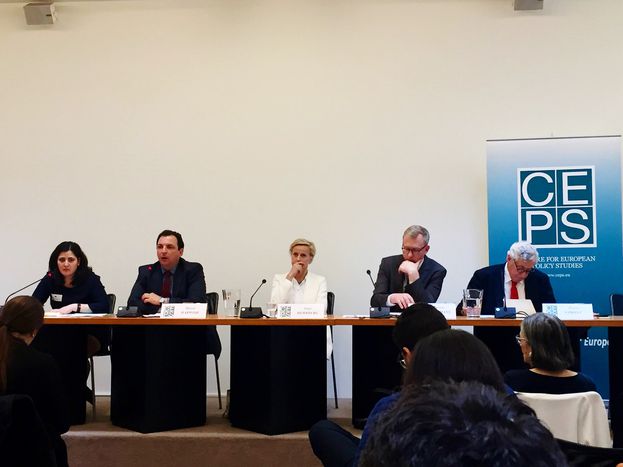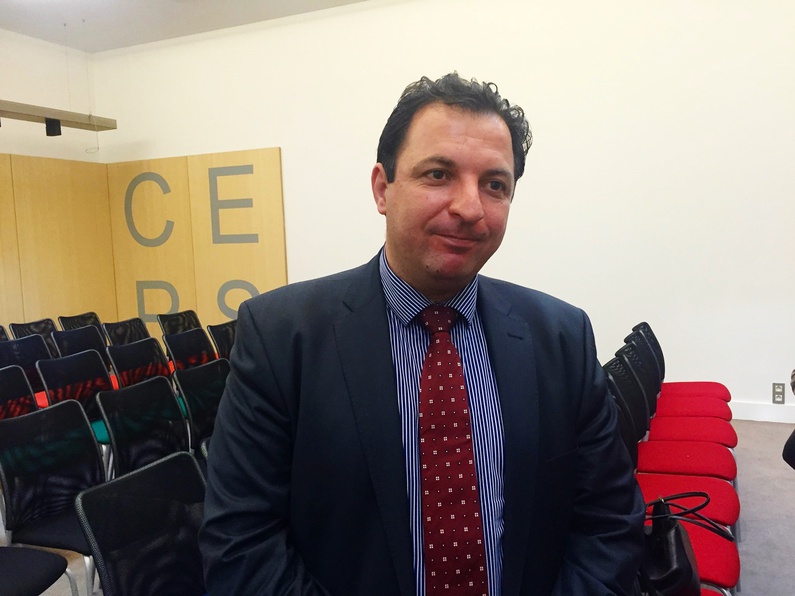
Syrian activist Mazen Darwish's stand for transitional justice
Published on
Translation by:
 Catherine Combes
Catherine Combes
The Syrian lawyer, former detainee and current president of the Syrian Center for Media and Freedom of Expression, was in Brussels to talk about post-conflict Syria.
On Wednesday, May 11th, a dozen people attended the general conference organized by the CEPS (Centre for European Policy Studies) on post-conflict Syria and the reconstruction of the country.
While three participants shared their views on the legal and political tools the various external powers could use to put an end to the conflict and commented on the reasons why past negociations failed, Mazen Darwish was the most eagerly awaited of the speakers.
Syrian lawyer and Human Rights advocate, he was arrested on February 16th, 2012 in Syria, and was detained for almost three and a half year before national authorities released him on August 10th, 2015. Now as president of the Syrian Centre for Media and Freedom of Expression, he travels the world to make his voice heard and draw attention to the civil war that's been raging in his country for five years.
He received the Guillermo Cano World Press Freedom Prize in 2015, and he was able to meet with representants of the European Commission and of the International Federation for Human Rights before his talk at the CEPS conference
The need for «transitional justice»
While it might seem premature or overly optimistic to talk of post-conflict Syria, given how entangled the situation still is, it is crucial to prepare for it in order to avoid total chaos like what we can observe in Lybia today. That was the central theme of the conference, and the reason why Mr. Darwish was invited to participate in it, since he had already expressed his thoughts on the matter. He highlights two main points: transitional justice and responsibility.
Transitional justice is similar to the process that went on after the 2011 revolution in Tunisia. This is not the revenge of one part of the society on another one, as there can be no peace without justice, in Mr. Darwish's eyes. It is about drawing consequences from an oppressive regime without endangering the institutional balance of the state. In no way can this be the justice of a dominant group of "winners" at the expense of an other group. Transitional justice aims at rebuilding the country, gradually and in a non-violent fashion.
Mr. Darwish admits that "acknowledging responsibilty [of all, not just of the defeated party] and transitional justice are key to finding reconciliation in Syria". According to him, that is the only political solution that can save the country from the crisis it experiences now and allow all communities to live together peacefully. If such a solution cannot be found, minorities will end up being marginalized and their safety will be jeopardized.

« The European Union needs to help rebuild Syria»
Another issue was extensively discussed during the conference: the involvement of foreign powers in the conflict. Like the other speakers, Mr. Darwish was critical of them and reminded that, beyond an internal battle within Syrian society, the crisis is a "regional war in which foreign countries defend their own interests". Still, in his view, "the European Union is geographically close to Syria and ought to be fully involved in peace talks and the reconstruction of the country".
That necessitates the elaboration of an ambitious plan: " We need to come up with a Marshal Plan for Syria, on an economic, political and social level". All foreign powers need to work together, Russia included, since it is a central actor in the Middle East.
Commenting on the involvement of foreign powers, Mazen Darwish stressed that it has to be thought about in relation to the refugee crisis and the way Western countries, especially the European Union, have been dealing with it. Refugees "are fleeing from oppression and terrorism, but also from future retaliation [...] We need to take those issues into account when discussing the waves of refugees coming to Europe".
According to Mr. Darwish, the problem with the EU approach is that it fails to act at the root of the problem. In reference to the agreement recently signed between the European Union and Turkey, he says: "I fully understand that the refugee crisis is preoccupying, but we need to deal with the specific reasons that caused Syrians to flee to Europe. The European Union needs to be aware of what is happening in Syria, and to move away from short-term solutions to the crisis to look at its long-term causes."
He ends mentionning the refugees who have already left Syria. "Another preoccupying element is the situation of the refugees who have arrived in Europe and neighboring countries. We need to create a positive, welcoming environment for them", especially economically and socially.
Translated from L'activiste syrien Mazen Darwish pour une justice transitionnelle


